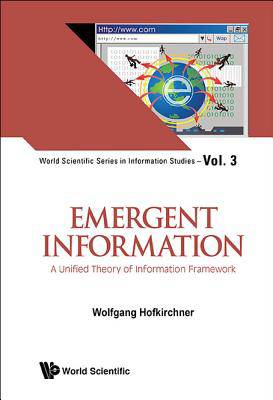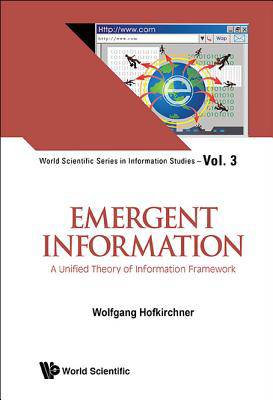
En raison d'une grêve chez bpost, votre commande pourrait être retardée. Vous avez besoin d’un livre rapidement ? Nos magasins vous accueillent à bras ouverts !
- Retrait gratuit dans votre magasin Club
- 7.000.000 titres dans notre catalogue
- Payer en toute sécurité
- Toujours un magasin près de chez vous
En raison de la grêve chez bpost, votre commande pourrait être retardée. Vous avez besoin d’un livre rapidement ? Nos magasins vous accueillent à bras ouverts !
- Retrait gratuit dans votre magasin Club
- 7.000.0000 titres dans notre catalogue
- Payer en toute sécurité
- Toujours un magasin près de chez vous
Emergent Information: A Unified Theory of Information Framework
Wolfgang Hofkirchner
160,45 €
+ 320 points
Description
At the dawn of the information age, a proper understanding of information and how it relates to matter and energy is of utmost importance for the survival of civilisation. Yet, attempts to reconcile information concepts underlying science and technology with those en vogue in social science, humanities, and arts are rather rare. This book offers a new approach, departing from fragmented information concepts.Many academics refrain from undergoing unifications, as most undertakings are reductionistic. This book contends that it is the noble task of an as-yet-to-be-developed science of information to go one step in the direction of a unified theory of information without falling back into neither reduction nor anthropomorphisation.To be able to succeed in an ambitious task like this, the book advocates the application of complex systems theory and its philosophical underpinnings. Information needs to be interpreted in terms of self-organisation to do justice to the richness of its manifestations. The way the book does so will provide the reader with a deep insight into a basic feature of our world.The following are discussed in the volume: A Science of Information; A New Way of Thinking; Praxio-Onto-Epistemology; Evolutionary Systems Design; Evolutionary Systems Ontology; Evolutionary Systems Methodology; Capurro's Information Concept Trilemma; A Multi-Stage Model of Evolutionary Types of Information: Pattern Formation, Code-Making, and Constituting Sense; A Triple-C Model of Systemic Functions of Information: Cognising, Communicating, and Co-Operating; Nine Categories of Information Capabilities: Reflectivity (physical), Psyche (biotic), Consciousness (human); Connectivity (physical), Signalability (biotic), Languageability (human); Cohesiveness (physical), Coherency (biotic), Communitarity (human); Nine Categories of Information: Response (physical), Flexible Response (biotic), Reflexion (human); Correspondences (physical), Signals (biotic), Symbolic Acts (human); Assemblage (physical), Assignment (biotic), Association (human); A Unified Theory of Information for, about, and by means of the Information Society.
Spécifications
Parties prenantes
- Auteur(s) :
- Editeur:
Contenu
- Nombre de pages :
- 292
- Langue:
- Anglais
- Collection :
- Tome:
- n° 3
Caractéristiques
- EAN:
- 9789814313483
- Date de parution :
- 01-02-13
- Format:
- Livre relié
- Format numérique:
- Genaaid
- Dimensions :
- 155 mm x 236 mm
- Poids :
- 553 g

Les avis
Nous publions uniquement les avis qui respectent les conditions requises. Consultez nos conditions pour les avis.






